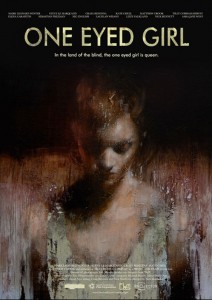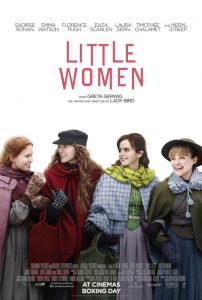Who wouldn’t like a bookshop in their main street? What kind of sociopath would it take to oppose such an innocent undertaking? These are the questions Florence Green (Emily Mortimer) didn’t expect to be asking of the fishing village of Hardborough. All the poor woman did was buy a little old house and set up her shop to fulfill a dream to honour the memory of her late husband. The house is like any old house in any old village out of an English nursery rhyme and has been left vacant for years, so logically it shouldn’t be much of a problem.
However, Ms Green does not know local matriarch Mrs Gamart (Patricia Clarkson). This regal mass of airs and graces has long had ambitions for this particular house to become a local arts centre, but Florence got there first and it baffles her that the villagers assume that she will assent to Mrs Gamart’s wishes and vacate. Is this the kind of sociopath she ought to look out for, Florence wonders?
Author Penelope Fitzgerald’s eye for postcard detail is immaculate, though it’s difficult to say if the substance of The Bookshop is nearly as engaging. While Isabel Coixet‘s film hints at a timely battle of conservatism and liberalism, a reliance on the quaintness and nostalgia of rural England is enough to suspect that the film might never have been made if Florence were waging the same war in the same bookshop but on an abandoned parkland earmarked for development in outer suburban London. Certainly the challenging nature of literature such as Lolita at the time this is set hints at a deeper exploration of cultural change, but these themes aren’t developed to anything substantial.
In fact, despite its high-minded ambitions, The Bookshop rarely probes much deeper than the common struggles of a seachanger’s small business venture and does little more than illustrate the insular and petty hierarchies of the arts community. Add in the unimaginative cinematography and a running time that could easily have lost half an hour and the whole enterprise falls a bit limp. Protracted images of Florence stroking the walls of her bookshop, smelling her books and sleeping on the floor (even though there is presumably a more than adequate bed upstairs) have the two-fold effect of, one, boring us and, two, contriving a story that never warrants a whimper, let alone the tears it longs for.
Without having read the book it’s hard to say how much of this is the fault of the source material or Coixet’s interpretation, but it is a pity to see an A-list cast try so hard and not be rewarded for their efforts. Mortimer is a charming lead and there is no upper lip stiffer than Bill Nighy‘s, and together they lend these proceedings a quiet dignity in the face of growing opposition. However, those around them offer a variety of missteps. James Lance as a playboy writer with the BBC gives a nudge-nudge performance more at home in the world of Jeeves and Wooster than this subdued affair, while Patricia Clarkson is particularly hard done by, playing the unenviable villain of the piece. When it’s not difficult to hear Clarkson’s faint enunciation, her motives for being such a roadblock are so hazily explained as to make her little more than a cardboard cutout aristocrat.
It hardly helps that neither Mrs Gamart nor Florence have any appetite for confrontation, so whatever clarity that might help to resolve their conflict is strangled by passive aggression that lacks any sort of spark. In this context, frustration is inevitable for all involved. I had thought that any new bookshops would be welcome, but I found this dawdle very hard to get behind.
The Bookshop is in cinemas from 24th May through Transmission Films.




